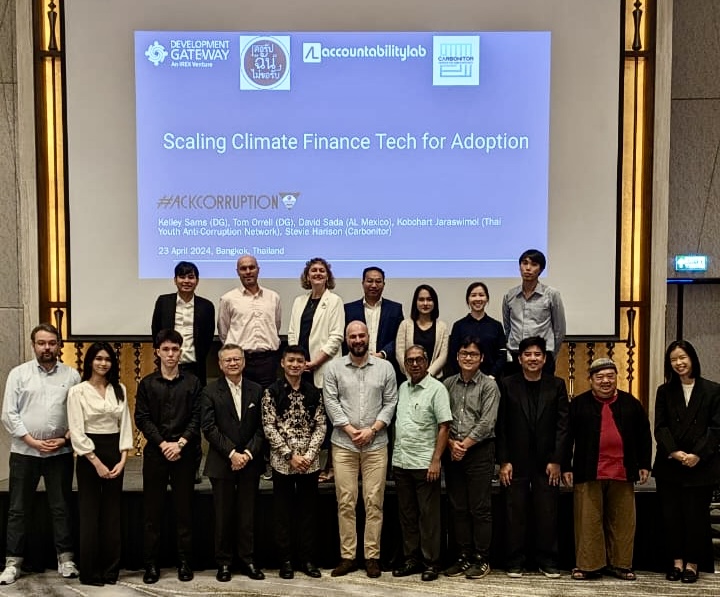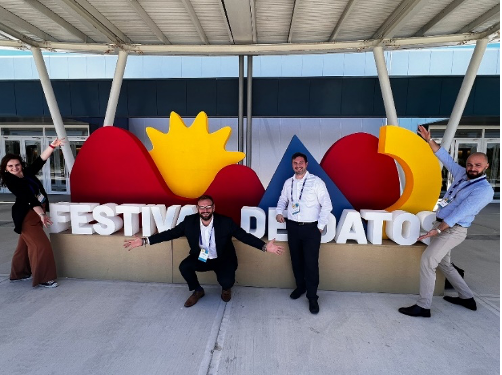M&E Tech Recap
Last week, Development Gateway participated in the M&E Tech Conference – moderating two panels and participating in a hands-on session. Below are highlights from each:
How Can We Leverage Open Data to Enhance Results?
DG’s Senior Director of Operations and Co-Executive Director of AidData Nancy McGuire Choi spearheaded a discussion with Kat Townsend (USAID), Chantale Wong (Independent), Rob Baker (Ushahidi), and Susan Stout (Georgetown).
- Consensus that open data is prompting a cultural shift but the revolution is about much more than just data and tech.
- Data demand currently stems from donors – we need to make data relevant for, and incentivize the usage of, data on the local decision-making level. Development agencies are small players in development; to make true progress, we need to understand who is empowered to do what within governments. USAID’s approach of “integrating new people into the conversation” searches out data advocates bu creating use cases and value propositions for end users.
- Data is political – to leverage open data for accountability, stakeholders need to recruit critics (i.e. press, thought leaders).
- We need to shift back to analysis – the focus on data standardization has lead to an emphasis on learning how to use tools; we need to learn how to read data, not how to use tools that process data. This has implications for the skills and profiles that are needed within donor agencies and in country, and hearkens back to the notion that this shift “back” will be disruptive for the development field.
- M&E means Motivation and Empowerment – we need to work with data users, not lecture at them.
What Can We Learn From GIS Data?
DG’s Director of Innovation Josh Powell moderated a panel session with Nate Heard (US Department of State, PEPFAR), Bill Dollins (Episcopal Relief and Development), and Erica Hagen (GroundTruth Initiative).
- Reports vs. results – we’re closing the gap between data usable for macro-level decisions and data relevant for ground-level prioritization.
- Inherent engagement – GIS data gets people excited, whether government stakeholders, practitioners, or citizens.
- Context is key – maps taken at face value can lead people to draw the wrong conclusions
- Appropriateness – there’s a fine line between confidentiality (important) and secrecy (political) GIS practitioners need to balance.
What’s Next in Visualizing Data for Better Decision Making?
Senior Associate Taryn Davis provided an overview of how GIS can help practitioners target, deliver, and evaluate aid more effectively.
- Maps provide an easily interpretable snapshot of Who What Where – avoiding duplication or over-concentration of development projects and allowing for better analysis of where need is concentrated.
- More and more countries using DG’s AMP have the capacity to geocode data for internal and external use.
- Tailoring data granularity is important – the use case will define how granular you need to go.
- There is a lot more to be done in terms of using GIS for decision making – to get the complete picture of development, we need to be able to show where government-development budgets are focused, and we need to improve skills for data analysis among all stakeholders.
Image source: www.mandetech.org
Share This Post
Related from our library

The Future of Technology Governance and Global Development: Why DG Brought DataReady In-house
DG is excited to announce we now have more robust data governance advisory services with the recent integration of DataReady.

Letting the Sunshine in: Building Inclusive, Accountable, and Equitable Climate Finance Ecosystems
In April, DG, HackCorruption, and the Thai Youth Anti-Corruption Network hosted a roundtable in Bangkok to discuss climate financing. This blog explores the main takeaway: a multi-disciplinary and multi-stakeholder approach that prioritizes local contexts, inclusive governance, transparency, accountability, and equitable distribution of resources is essential to impactful climate financing.

Developing Data Systems: Five Issues IREX and DG Explored at Festival de Datos
IREX and Development Gateway: An IREX Venture participated in Festival de Datos from November 7-9, 2023. In this blog, Philip Davidovich, Annie Kilroy, Josh Powell, and Tom Orrell explore five key issues discussed at Festival de Datos on advancing data systems and how IREX and DG are meeting these challenges.